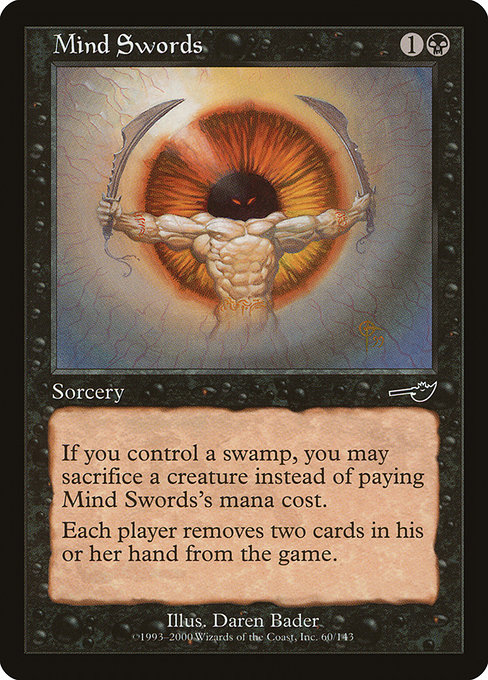
Image courtesy of Scryfall.com
The Ethics of Speculation in MTG Finance: A Mind Swords Case Study
Magic: The Gathering has always lived at the intersection of play, collection, and commerce 🧙♂️🔥. The ethics of MTG finance—how we value, trade, and speculate on cards—forms a persistent undercurrent beneath every booster draft and trader’s corner. When a card like Mind Swords from Nemesis surfaces in the conversation, it’s a natural moment to pause and examine what motivates market moves, who bears the costs, and what kind of community we want to sustain 💎⚔️. Mind Swords is a black (B) sorcery from the Nemesis set (released February 14, 2000) with a modest mana cost of 1B, yet its price threads through the broader loom of scarcity, accessibility, and strategic experimentation that defines MTG finance.
Design-wise, Mind Swords stands out for its paradoxical symmetry. If you control a Swamp, you may sacrifice a creature instead of paying the spell’s mana cost, a neat nod to black’s resourceful, sometimes grim pragmatism. More striking is the second clause: “Each player exiles two cards from their hand.” That binary act—exiling cards from everyone’s hand—puts a spotlight on how quickly a game can tilt when resources disappear from view. It’s a texture of the game that mirrors real-world market dynamics: when liquidity dries up or information gaps appear, players—like traders—must recalibrate quickly or risk a misstep that cascades beyond their own strategy 🧭🎲.
As a common rarity card in Nemesis, Mind Swords wasn’t designed to shock the bank account, yet its historical footprint invites reflection on value and access. Common cards are typically the backbone of budget decks and casual play, making them more resilient to mass hoarding than ultra-rare staples. However, even commons can ride price waves driven by popular formats, reprint news, or a sudden nostalgia spike for a particularly evocative design or art—Daren Bader’s atmospheric illustration adds to Mind Swords’ lingering charm, encouraging collectors to weigh sentiment against utility 🎨. The broader point: rarity is not a guarantor of ethics, and even widely available cards can become flashpoints for price anxiety if speculation tightens supply unwittingly.
So what makes speculation ethically tricky in MTG? On one hand, speculative trading rewards savvy investors who help unlock liquidity, enable timely sales, and provide a market signal that product teams use to gauge demand. On the other hand, aggressive hoarding, bulk purchases, or spreading misinformation can create barriers for players who want to actually build decks or enjoy sealed product. Mind Swords’ symmetrical exile effect becomes a fitting metaphor: in a healthy market, disruption serves a broader community discipline rather than a single faction’s gain. The risk is when a card’s value seems to ride a rumor more than its staying power in decks and formats 🧙♂️💎.
Responsible play in MTG finance invites a few simple, durable habits. Prioritize playability and community value over the quick flip, and be mindful of price disparities that bloat entry costs for new players. If you’re considering bulk purchasing, pause to ask whether the move will help or harm the ecosystem you love. Support open discussions about reprint potential and price stabilization; stable prints tend to foster a healthier market and a broader base of players who can actually participate in the game they adore ⚖️🎲. Mind Swords reminds us that disruption can be leveraged with intention—it's not the tool itself, but how we wield it that shapes the narrative of MTG finance.
From a gameplay perspective, Mind Swords invites a thoughtful approach in a black-control or hand-disruption shell. The card’s cost, its swamp-based payment option, and the shared exile effect encourage players to consider timing, tempo, and the risks of depleting resources both on the battlefield and in hand. It’s a reminder that even a spell with a simple casting cost can ripple through the game’s social contract—your choices influence not just the next draw, but the room’s atmosphere and how players talk about the game after the match ends 🧙♂️⚔️. In a hobby built on stories as much as staples, Mind Swords contributes to the lore of a meta where cards are not just numbers on cardboard but shared experiences that connect players across time and space.
Neon Card Holder MagSafe Phone Case for iPhone 13 Galaxy S21 S22More from our network
- https://blog.crypto-articles.xyz/blog/post/nft-data-bitcreep-89-from-the-bitcreeps-collection-on-magiceden/
- https://crypto-acolytes.xyz/blog/post/astrometric-wobble-reveals-companions-around-blue-beacon-in-scorpius/
- https://blog.crypto-articles.xyz/blog/post/nft-data-lion-of-liquania-416-from-lions-of-liquania-collection-on-magiceden/
- https://crypto-acolytes.xyz/blog/post/far-cry-3-vs-crysis-which-game-has-the-better-open-world/
- https://crypto-acolytes.xyz/blog/post/nft-stats-midevil-1135-from-midevils-collection/

Mind Swords
If you control a Swamp, you may sacrifice a creature rather than pay this spell's mana cost.
Each player exiles two cards from their hand.
ID: 3d6d91df-008b-48f2-a84f-550702fbcdb3
Oracle ID: 4af20f8c-2ba0-49d5-a64e-d3668cec30cd
Multiverse IDs: 21313
TCGPlayer ID: 7181
Cardmarket ID: 11783
Colors: B
Color Identity: B
Keywords:
Rarity: Common
Released: 2000-02-14
Artist: Daren Bader
Frame: 1997
Border: black
EDHRec Rank: 22847
Penny Rank: 7776
Set: Nemesis (nem)
Collector #: 60
Legalities
- Standard — not_legal
- Future — not_legal
- Historic — not_legal
- Timeless — not_legal
- Gladiator — not_legal
- Pioneer — not_legal
- Modern — not_legal
- Legacy — legal
- Pauper — legal
- Vintage — legal
- Penny — not_legal
- Commander — legal
- Oathbreaker — legal
- Standardbrawl — not_legal
- Brawl — not_legal
- Alchemy — not_legal
- Paupercommander — legal
- Duel — legal
- Oldschool — not_legal
- Premodern — legal
- Predh — legal
Prices
- USD: 0.21
- USD_FOIL: 5.99
- EUR: 0.12
- EUR_FOIL: 5.77
- TIX: 0.07
More from our network
- https://crypto-acolytes.xyz/blog/post/pokemon-diamond-and-pearl-which-starter-is-best/
- https://wiki.digital-vault.xyz/wiki/post/pokemon-tcg-stats-island-hermit-card-id-ex15-76/
- https://crypto-acolytes.xyz/blog/post/nft-stats-lil-gargs-mass-mint4245-from-lil-gargs-mass-mint-collection/
- https://articles.zero-static.xyz/blog/post/river-of-tears-casual-deck-win-rate-deep-dive/
- https://crypto-acolytes.xyz/blog/post/nft-stats-solidskulls-159-from-solidskulls-collection/
